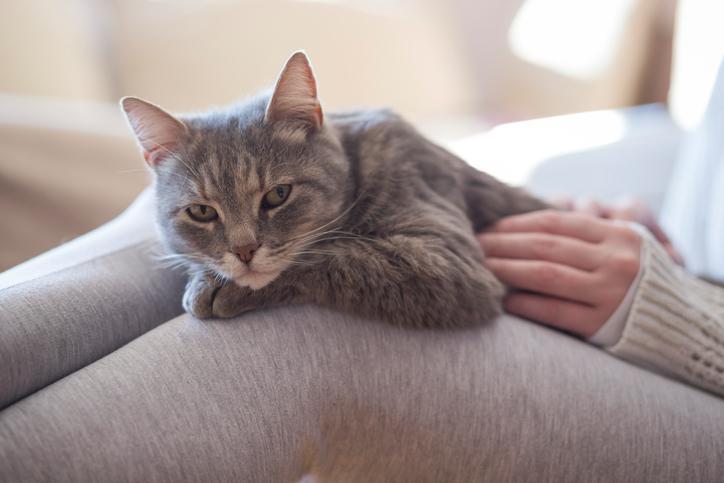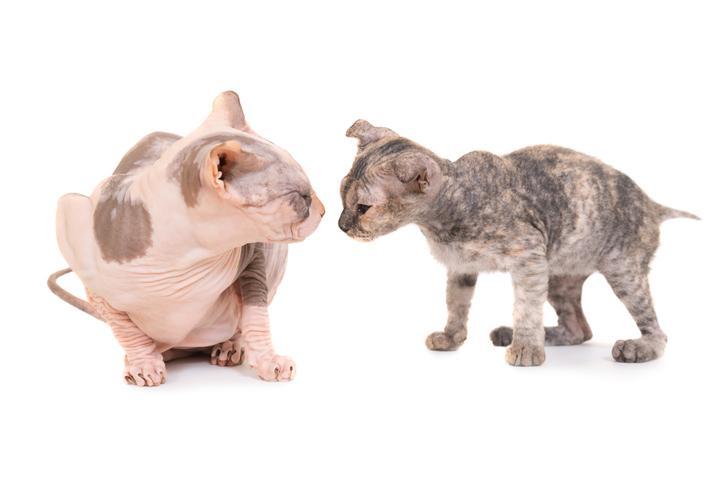Why is My Cat So Possessive?



See files for Cats
Jealousy is not a personality trait reserved only for humans[1]. It is common to see many cats either gradually or suddenly become possessive over their human guardians. While some people may take this as a simple sign of affectionate attachment, a possessive cat can actually be a risk to themselves, to their owners and others around them. This is especially the case when possessiveness turns to aggressiveness. It can cause behavioral problems when vistors arrive in the home or if a new member of the family is not properly introduced to a cat's territory. It can make a healthy co-existence all but impossible.
Have you noticed your cat gets jealous when others give you attention? Do they behave inappropriately when others are in the room. If so, AnimalWised is here to help you understand why your cat is so possessive and what you can do about it.
Why are cats possessive of their owners?
To answer this question, it can be helpful to think a little about human behavior. When a person feels jealous of someone, it is usually a sign they are afraid of losing their attention or being replaced by someone or something else. This means when a new person arrives into a situation, instead of it being seen as an opportunity to share in new experiences together, it is viewed as a possible threat to the stable relationship which existed before the new arrival.
As with human beings, cats can become possessive with their guardians. They may not want to share their affection and fun moments with anyone else. However, the reason behind the jealousy is not as complex as what happens to the human psyche. The most common cause of this behavior in the animal world is defined as a protection of resources. This is because cats are creatures of routine as a way to preserve their well-being and avoid dangerous or unpleasant situations. This routine is not simply when to eat or where they go in their environment. It also involves the people and animals with which they interact over the course of a day. If a cat is accustomed to living alone with their owner and someone else enters the picture, they can perceive this as a threat to their well-being and become possessive.
The presence of a new person in a cat's life can threaten their stability and generate an instinctual rejection. In this way, it is not that it feels jealousy in that it affects their ego or emotional insecurity. It is not through malice or the rejection of an individual's character. It is because another person can threaten the relationship a cat has with their guardian as they are their resource for food, shelter and security.
Possessiveness due to a fear of losing resources usually occurs when a cat has not been socialized properly when they were young. They have not had the opportunity to learn how to relate positively with other animals, people or even toys. When they are exposed abruptly to the presence of an unknown being they essentially don't know how to deal with it and act out accordingly. They feel like their space is being invaded and the things they want and need are going to be taken away from them.
A cat might also feel displaced if their human friend stops paying attention to them. This is especially so if there is a new person in the family, perhaps even more so with a new animal. Unfortunately, this can be very common in couples who decide to have a child. As a child requires constant care and attention from new parents, the cat can have an understandable reduction in the attention they receive.
Also, cats which have experienced trauma previously may exhibit possessive behavior. If you adopt a cat into your life and then spend all your time together, then you will often feel a strong bond. The cat goes from a stressful situation to a loving one and they become dependent on you. If you bring someone new into this situation, they can feel more threatened as they fear they might go back to the stressful way of things. This can be exacerbated by gender. For example, if a person was abused by a man and goes to live in a new home with a woman. When a man comes into the relationship, the cat can have a natural aversion and become more possessive.
How to recognize a possessive cat
Cats use their body language to express their feelings and perceptions. Therefore, when they feel possessive of their guardian of overprotective of their resources, you can see it in how they behave. Pay attention to the following signs if you think your cat may be too possessive:
- Mood changes: a cat may be depressed as they feel abandoned by their guardian. They may respond by developing hyperactivity to try to gain their owner's attention.
- Hiding: your cat may leave and hide whenever a new person comes into the frame, trying to make you look for them or running away out of fear.
- Agitation: possessive ad jealous humans often act out physically and cats can do the same. They may start attacking the new person or they may even attack you as a way to get your attention. If there is a new pet in the family, in particular, then a possessive cat may attack them (although it is important to distinguish betwen attacking and playing).
- Depression: your cat may become depressed and lethargic if they feel they are being threatened by someone else. They may not respond to petting or playing as much and spend all their time sleeping instead of engaging.
If there is a new cat entering the household, you may want to take a look at our article on how to introduce a new cat into the home to see what you need to do for a smooth transition.

What to do if your cat is very possessive with you
As with many diseases, possessiveness is better dealt in terms of prevention rather than cure. Ensure your cat is socialized early if you want to prevent your cat from becoming possessive in the future. During their adolescence, kittens will learn the nature of coexistence, but making sure they stay with their mother and the rest of the litter for at least 8 weeks is very important for this also. After their first round of vaccinations and deworming, you can start introducing them to other humans, other cats and other pets. If you have adopted an adult cat, you may need some help on how to socialize an adult cat.
If you decide to bring a new cat into the home, it is vital you prepare any existing cats for their arrival. It is also essential to prepare your home to receive this new family member. A cat must have its own toys, food bowl, drinking water and even their own litter tray. Remember not to spend more time with another cat and let them monopolize your attention. This is unless the cat does not enjoy much interaction.
If you move in with a partner, get a new roommate or even have a new arrival in the form of a baby, it's crucial you don't stop providing them with attention and affection. Our cats should feel part of the fail and not that they will be replaced or ignored.
If you notice you cat becoming too aggressive and you are unable to handle it, you may need to bring in an ethologist or cat behavior specialist. Take them to the vet and ask them for advice. Some cats become aggressive for other reasons, whether psychological or physical, so they will also be able to rule out any underlying pathology.

If you want to read similar articles to Why is My Cat So Possessive?, we recommend you visit our Behavioral problems category.






 I have a tabby who made his way to my door step a year ago, he was very young maybe 6 or 8 weeks old.
I have a tabby who made his way to my door step a year ago, he was very young maybe 6 or 8 weeks old. 


